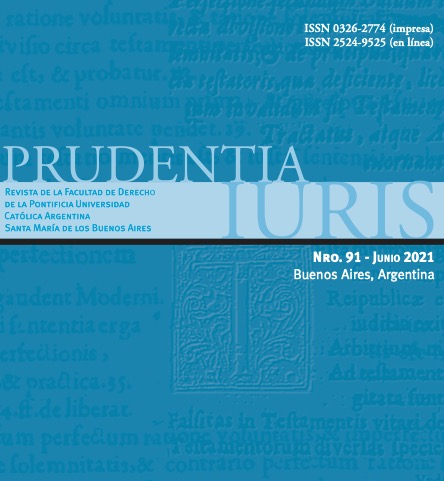SOBRE EL CONTRACTUALISMO. CONSECUENCIAS POLÍTICAS Y JURÍDICAS (I)
DOI:
https://doi.org/10.46553/prudentia.91.2021.pp.203-221Palabras clave:
Estado de naturaleza, Contrato social, Orden jurídico-político, Consentimiento, ConstitucionalismoResumen
El presente trabajo pretende esclarecer algunas de las consecuencias que el contractualismo trae al Derecho y la política (virtualidad, voluntarismo, anarquía, positivismo, estatismo, etc.), valiéndose de un examen del estado de naturaleza y del significado del contrato social. Se ha elaborado en base a fuentes y consultando la bibliografía especial.Contractualismo;
Descargas
Referencias
Bobbio, N. (1986). “El modelo iusnaturalista”. En Bobbio, N. y Bovero, M. Sociedad y Estado en la filosofía moderna. El modelo iusnaturalista y el modelo hegeliano-marxiano. México. FCE, 13-145.
Brett, A. S. (2011). Changes of state. Nature and the limits of the city in early modern natural law. Princeton & Oxford. Princeton University Press.
Caro, J. (2011). The origins of free people. New York & London. Continuum.
Castellano, D. (2020). Introducción a la filosofía de la política. Breve manual. Madrid. Marcial Pons.
Castellano, D. (2016). Martín Lutero. El canto del gallo de la Modernidad. Madrid. Marcial Pons.
Castellano, D. (1993). La razionalitÁ della politica. Napoli. Edizioni Scientifiche Italiane.
Dicus, A. (2015). “‘Some man’ and the savage”. Prose Studies Nro. 37/2, 97-111.
Dunn, J. (1969). The political thought of John Locke. Cambridge. Cambridge University Press.
Gentile, F. (2001). El ordenamiento jurídico, entre la virtualidad y la realidad. Madrid. Marcial Pons.
Gentile, F. (1983). Intelligenza politica e ragion di Stato. Milano. GiuffrÁ¨.
Gierke, O. (1950). Natural law and the theory of society: 1500 to 1800. Cambridge. Cambridge University Press.
Gillespie, M. A. (2008). The theological origins of modernity. Chicago & London. The University of Chicago Press.
Grotius, H. (1625). The rights of war and peace. Indianapolis. Liberty Fund (2005).
Gunn, J. A. W. (October-December 1968). “Interest Will Not Lie: a seventeenth-century political maxim”. Journal of the History of Ideas Nro. 29/4, 551-564.
Haakonssen, K. (1996). Natural law and moral philosophy. From Grotius to the Scottish Enlightenment. Cambridge. Cambridge University Press.
Hazard, P. (1988). La crisis de la conciencia europea (1680-1715). Madrid. Alianza.
Hirschman, A. O. (1977). Las pasiones y los intereses. México. FCE.
Hobbes, Th. (1651). “Leviathan”. En Hobbes, Th. The works of Thomas Hobbes. III. London. John Bohn. 1839.
Hobbes, Th. (1642). “De cive”. En Hobbes, Th. The works of Thomas Hobbes. II. London. John Bohn. 1839.
Hume, D. (1739). Tratado de la naturaleza humana. Madrid. Tecnos. 1992.
Kahn, V. A. (2004). Wayward contracts. The crisis of political obligation in England, 1640-1674. Princeton & Oxford. Princeton U.P.
Lamprecht, S. P. (1940). “Hobbes and Hobbism”. American Political Science Review Nro. 34/1, 31-53.
Locke, J. (1689). Two treatises of government. London. 1768.
Matteucci, N. (2010). “Contractualismo”. En Matteucci, N. El Estado moderno. Léxico y exploraciones. Madrid. Unión Editorial - Universidad Francisco Marroquín, 107-133.
Pufendorf, S. (1673). On the Duty of Man and Citizen According to Natural Law. Cambridge. Cambridge University Press. 2006.
Pufendorf, F. (1672). Le droit de la nature et des gens. Amsterdam. 1734.
Riley, P. (1982). Will and political legitimacy. A critical exposition of social contract theory in Hobbes, Locke, Rousseau, Kant, and Hegel. Cambridge. Harvard University Press.
Rousseau, J. J. (1762). “Du contrat social ou Principes de Droit Politique”. En Å’uvres. V. Paris. Lequien. 1821.
Rousseau, J. J. (1762). “Émile ou de l’éducation”. En Å’uvres. VIII y IX. Paris. Lequien. 1821.
San Agustín (426). “La Ciudad de Dios“. En San Agustín. Obras. XVI y XVII. Madrid. BAC. 1958.
Segovia, J. F. (2016). “Lutero y los orígenes religiosos de la secularización”. En Ayuso, M. (Ed.). Consecuencias político-jurídicas del protestantismo. A los 500 años de Lutero. Madrid. Marcial Pons, 49-84.
Segovia, J. F. (2014). La ley natural en la telaraña de la razón. Ética, derecho y política en John Locke. Madrid. Marcial Pons.
Segovia, J. F. (2014). “John Locke y la ley de la moda. De la teología a la sociología de la ley natural”. Revista de Estudios Histórico-Jurídicos Nro. XXXVI, 467-479.
Simmons, A. J. (1995). On the edge of anarchy. Locke, consent, and the limits of society. Princeton. Princeton University Press.
Sternberger, D. (1992). “La vieja polémica acerca del origen de la dominación”. En Sternberger, D. Dominación y acuerdo. Barcelona. Gedisa, 29-41.
Strauss, L. (1953). Natural right and history. Chicago. University of Chicago Press.
Strauss, L. (October 1950). “On the spirit of Hobbes’ political philosophy”. Revue Internationale de Philosophie Nro. 4/14, 405-431.
Walzer, M. (August 1984). “Liberalism and the art of separation”. Political Theory Nro. 12/3, 315-330.
Williams, R. (1644). The Bloudy Tenent, Of Persecution, For Cause of Conscience. London. J. Haddon. 1848.
Zuckert, M. P. (1994). Natural rights and the new republicanism. Princeton. Princeton University Press.
Descargas
Publicado
Número
Sección
Licencia










